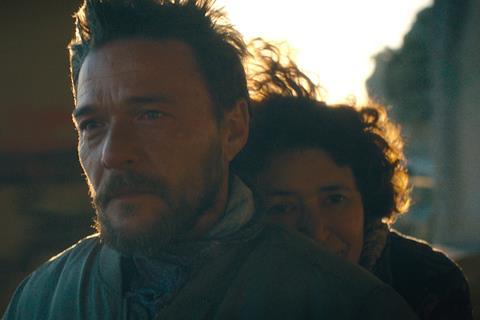Director Aristotelis Maragkos was inspired by the work of symbolist sailor-poet Nikos Kavvadias

Dir: Aristotelis Maragkos. Greece. 2025. 92mins
Elias, the protagonist of the drama Beachcomber, attempts to build a boat out of scrap metal as he tries to figure out who he is in the shadow of his sailor father, whose tales he sometimes tries to pass off as his own. Starring Dogtooth’s Christos Passalis and one of several Greek films in Thessaloniki competition, this is an ambitious and uneven work that’s best qualified as a lyrical exploration of what drives a person – even when they know that failure likely lies ahead. It may command further festival interest, but theatrically may have a harder time traveling beyond the Greek archipelago.
Passalis carries the film with ease
The bearded, tattooed Elias (Passalis) is a fortysomething man with a dark past that probably includes a bout in prison – though, like much of the film, which was co-written by director Aristotelis Maragkos (The Timekeepers of Eternity) and Chrysoula Korovesi, the exact details seem to be forever just out of reach. What’s clear is that Elias is a part of a squalid seaside community where he manages to find, with the help of some locals, a half-buried metal carcass of a Russian vessel that’s in a semi-reasonable state. Because it’s on an isolated stretch of beach, it seems entirely possible the boat could be repaired without too many people noticing and then sold – or, alternatively, used as a means of escape.
But in what’s a relatively heavy metaphor, the boat is just a little too cumbersome, and a little too far from the actual water, to make this dream an easy reality. Still, Elias recruits some of his misfit acquaintances — none of whom seem to have any particular backstory, though they all have great faces — and also starts working at a local scrapyard. The latter provides him, not quite legally, with the materials and tools he needs for his crazy endeavour.
Passalis, who besides Dogtooth is probably best known internationally for his roles in Syllas Tzoumerkas films Homeland (2010) and The Miracle of the Sargasso Sea (2019), cuts an imposing figure and is a suitably charismatic rebel who carries the film with ease. Elais’s body, which he tattoos himself with various sea-themed elements, become a kind of canvas on which to try out his father’s seafaring personality. That said, the character’s internal struggles are more often inferred than clearly spelled out, making his psychological depths harder to figure out.
Beachcomber was inspired by the poetry of Nikos Kavvadias, a symbolist sailor-poet who wrote about life at sea and in faraway ports as allegories for the desire of people to escape their everyday life. With this knowledge in hand, the fragmented and allusive narrative is already somewhat easier to anchor, though audiences outside of Greece will likely be less familiar with Kavvadias’s work.
More universal are the film’s craft elements. Technically, this is a beautifully atmospheric film that mixes different types of footage strung together by editor Thodoris Armaos with an eye for emotion rather than narrative continuity. The battered production design by Stavros Liokalos clearly signals that we’re about as far away from tourist Greece as possible, suggesting these locations are stagnant places that most people would be desperate to leave.
Production company: Plankton
International sales: Plankton, Konstantinos Koukoulis konstantinos@planktonfilms.com
Producer: Konstantinos Koukoulis
Screenplay: Chrysoula Korovesi, Aristotelis Maragkos
Cinematography: Giorgos Karvelas
Production design: Stavros Liokalos
Editing: Thodoris Armaos
Main cast: Christos Passalis, Aliki Andriomenou, Stathis Kokkoris, Sotiris Belsis, Lefteris Polychronis, Eleni Karageorgis, Gioula Bountali
























